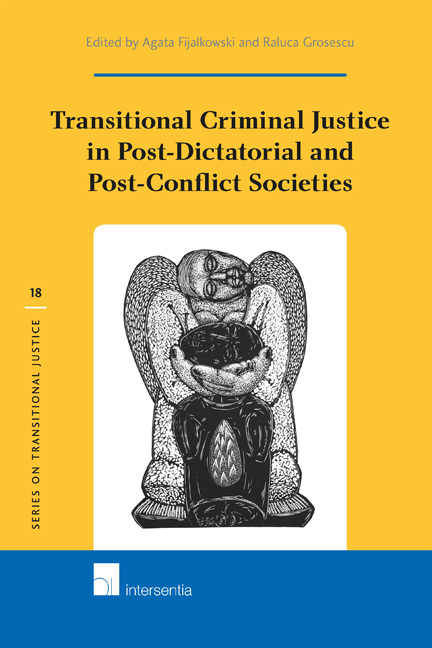Book contents
- Frontmatter
- Contents
- Introduction
- PART I CRIMINAL JUSTICE AS A METHOD OF DEALING WITH THE PAST: OPPORTUNITIES, STRATEGIES, AND LEGAL AND POLITICAL CONSTRAINTS
- Chapter 1 Retrospective Justice: Post-Communist Germany and Poland in Comparative Perspective
- Chapter 2 Transitional Justice in Nepal: Prosecutions, Reform and Accountability Strategies
- Chapter 3 Transitional Trials as History Writing: The Case of the Romanian December 1989 Events
- Chapter 4 Transitional Criminal Justice: The Polish Way
- Chapter 5 Public Contestation and Politics of Transitional Justice: Poland and Albania Compared
- Chapter 6 Consolidating Democracy Through Transitional Justice in Slovenia: Lessons Learnt?
- PART II UNIVERSAL PRINCIPLES V LOCAL PECULIARITIES: THE RELATIONSHIP BETWEEN NATIONAL JURISDICTIONS AND INTERNATIONAL LAW
- About the Authors
Chapter 3 - Transitional Trials as History Writing: The Case of the Romanian December 1989 Events
from PART I - CRIMINAL JUSTICE AS A METHOD OF DEALING WITH THE PAST: OPPORTUNITIES, STRATEGIES, AND LEGAL AND POLITICAL CONSTRAINTS
Published online by Cambridge University Press: 28 November 2017
- Frontmatter
- Contents
- Introduction
- PART I CRIMINAL JUSTICE AS A METHOD OF DEALING WITH THE PAST: OPPORTUNITIES, STRATEGIES, AND LEGAL AND POLITICAL CONSTRAINTS
- Chapter 1 Retrospective Justice: Post-Communist Germany and Poland in Comparative Perspective
- Chapter 2 Transitional Justice in Nepal: Prosecutions, Reform and Accountability Strategies
- Chapter 3 Transitional Trials as History Writing: The Case of the Romanian December 1989 Events
- Chapter 4 Transitional Criminal Justice: The Polish Way
- Chapter 5 Public Contestation and Politics of Transitional Justice: Poland and Albania Compared
- Chapter 6 Consolidating Democracy Through Transitional Justice in Slovenia: Lessons Learnt?
- PART II UNIVERSAL PRINCIPLES V LOCAL PECULIARITIES: THE RELATIONSHIP BETWEEN NATIONAL JURISDICTIONS AND INTERNATIONAL LAW
- About the Authors
Summary
This chapter explores the relationship between transitional criminal justice and history writing in post-Communist Romania. It analyses the trials held concerning the repression of the December 1989 popular uprising, focusing on the narratives they have produced about the fall of the Ceauşescu regime and the responsibility for state-perpetrated violence. On the one hand, we evaluate the various interpretations that trials have given the events of December 1989, the symbolic founding moment of a new political order, as well as the political legitimacies constructed around these narratives. On the other hand, the chapter contributes to the general debate on the role of transitional criminal justice in building a common historical understanding of a former dictatorial regime. We will show that in Romania, in spite of important contributions of these trials to a gradual normalisation of the historical discourse about December 1989, their epistemic function was compromised by the interference of politics in the working of justice, and by the lack of predictability in judicial procedures.
INTRODUCTION
Various transitional justice scholars argue that trials held against former leaders of dictatorial regimes are not only forms of making justice, but also important processes of narrative construction, understood as ‘storytelling’ (mise en recit) about the repressive past. Besides performing the classic functions of criminal justice (punishing the guilty, preventing similar deeds in the future and reinforcing respect for the law), transitional trials may also play an epistemic role in societies in transition. According to Osiel, Niño or Teitel, the trial's verdict, with its legal and historical contextualisation and outcomes represents an ‘official and normative’ version of events that forges a common historical memory of the recent past. Transitional trials are seen as ‘monumental spectacles’ that affirm the contrast between the dictatorial past and the democratic present. They can also be viewed as ‘constitutional moments’ which provide narratives of history and simultaneously of morality, tales of what went wrong and how the future should be. By giving a voice to victims and perpetrators, by selecting what it is to be judged and remembered, and in which way, and by deciding on guilt and innocence, trials are forms of remembrance and history writing. The Nuremberg trials or Adolf Eichmann's conviction in Jerusalem are examples of the way in which criminal proceedings have modelled public awareness of mass murder.
- Type
- Chapter
- Information
- Publisher: IntersentiaPrint publication year: 2015



